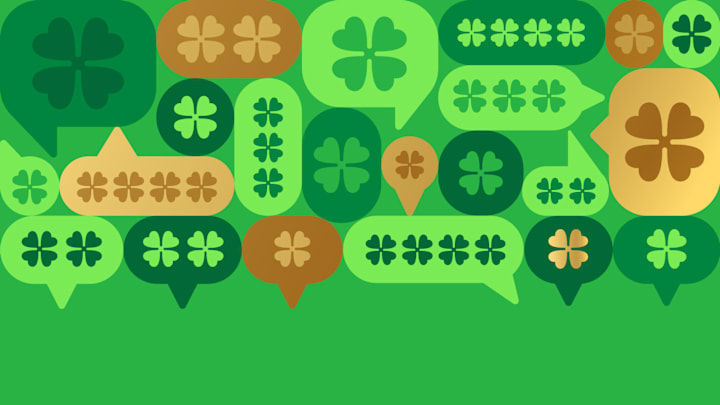What comes to mind when you think of Irish words? Maybe begorra, an alteration of “by God,” or shillelagh, a blackthorn walking stick and, to some, a symbol of Irishness. And let’s not forget shamrock, which comes from the Irish seamróg, a diminutive of seamar or “clover.” But there is a whole slew of everyday words in English that have origins in Irish and Gaelic. Here are a few common English words you might not know have Irish blood.
Bother
While the Oxford English Dictionary (OED) says the etymology of bother is unknown, the earliest usages are by Irish writers. In 1718, Irish actor and educator Thomas Sheridan used bother to mean “to bewilder with noise” or “to confuse.” In 1745, Jonathan Swift used it to mean “to annoy or worry.” About a hundred years later, English writer Charles Dickens used bother as an interjection: “To this amorous address Miss Brass briefly responded ‘Bother!’ ”
Hubbub
So what’s the hubbub with hubbub? The word originated in the 16th century as “the shouting of a war cry,” according to the OED, as well as the confused noise of a crowd. It may come from an Irish expression like ub! ub! ubub! which is an interjection expressing contempt, or the ancient Irish war cry, abu. Hubbub was also the name given by colonists in 1600s New England to a Native American gambling dice game that apparently involved much shouting and, well, hubbub.
Trousers
The word trousers is an extension of trouse, which appeared in English in the 16th century and came in part from the Irish triús. Trouse referred specifically to a snug piece of clothing for the backside and thighs that ran down the legs and was attached to stockings. They began in the 17th century as a piece of ankle-length loose cloth before evolving into the two-legged duds we know today.
Puss
Another word for the ol’ kisser, puss comes from the Irish pus, meaning “lip or mouth.” It can also refer to a sour look or pout.
Bog
This term for a piece of wet spongy ground comes from the Irish bogach. Bog-trotter was a derogatory name given to the “wild Irish” (those not under English rule) of the 17th century, and was later extended to mean anyone of Irish descent.
Puck
Don Rickles can thank Irish Americans for his most famous insult. The word puck entered English in the 1850s to mean “a blow, punch, or strike”; it came from the Irish poc, a term in used hurling, a game similar to field hockey. By the 1880s, puck came to refer to the flat disc used in ice hockey.
Discover More Stories About the Irish Language:
A version of this story ran in 2016; it has been updated for 2025.
